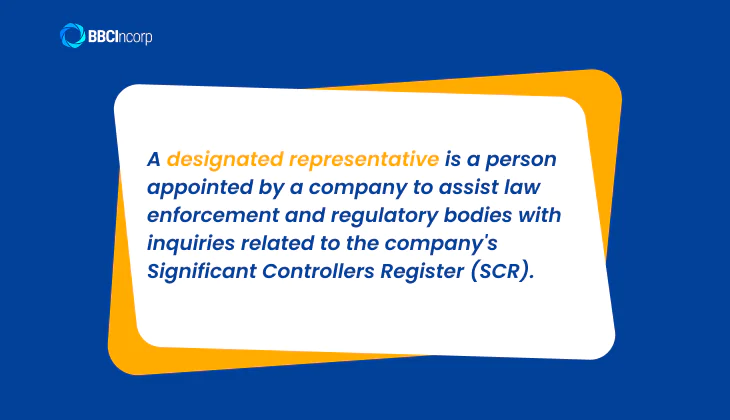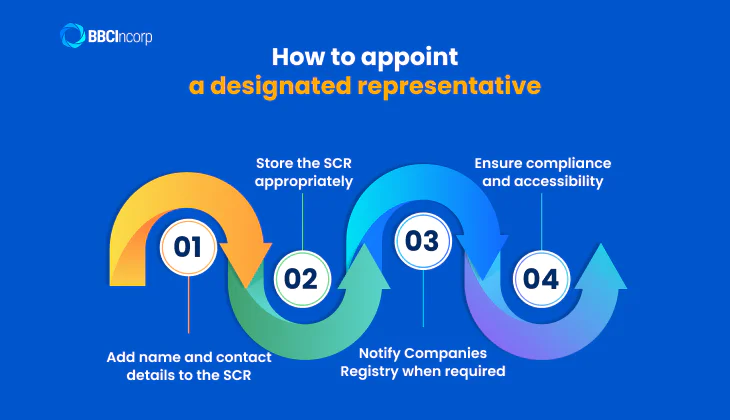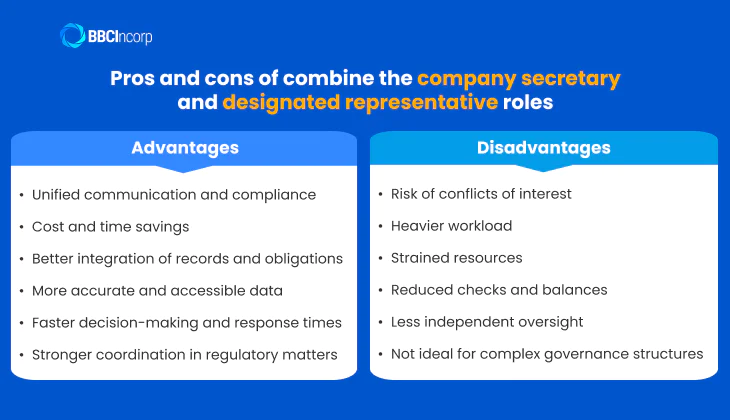
- Designated representative: definition and responsibilities
- Consequences of non-compliance
- Who needs a designated representative and why?
- How to appoint a designated representative
- Designated representative vs. company secretary
- Can a designated representative be a company secretary?
- Should you appoint internal staff or outsource your designated representative?
- Company secretary Hong Kong service by BBCIncorp
- Conclusion
In Hong Kong, the concept of a designated representative has become increasingly important under the city’s evolving regulatory framework.
Introduced as part of the Companies Ordinance and tied closely to the Significant Controllers Register (SCR) requirements, the designated representative plays a key role in ensuring transparency and corporate accountability.
Every company incorporated in Hong Kong—unless exempt—must appoint at least one designated representative to assist law enforcement officers in accessing the SCR when needed. Failure to comply can lead to substantial penalties, making this role critical for ongoing legal compliance.
In this blog, we’ll explain what a designated representative Hong Kong is, why your business needs one, and how to meet Hong Kong’s compliance requirements effectively. Let’s dive into the details.
Designated representative: definition and responsibilities
Who exactly is a designated representative, and why is this role becoming indispensable for Hong Kong companies? Understanding their definition and responsibilities is key to staying compliant under the Companies Ordinance and Significant Controllers Register regulations.
What is a designated representative?
The designated representative is a legal construct born from the Companies (Amendment) Ordinance 2018, enforced from March 1, 2018, alongside the Significant Controllers Register (SCR) regime.
As defined by the Companies Registry Hong Kong, this individual must be a Hong Kong–resident natural person and may be a shareholder, director, or employee of the company, or alternatively a licensed accounting or legal professional or Trust/Company Service Provider (TCSP).
Their role is central in the SCR framework, which requires all non‑listed Hong Kong companies to maintain a detailed registry of those with significant control—defined as over 25% shareholding, voting rights, board appointment power, or de facto control by any legal business entity or individual.

The roles of designated representative
Under the companies ordinance and SCR rules, every applicable company must appoint at least one designated representative. Their responsibilities include:
They ensure that the SCR itself—detailing designated representative information, significant controller particulars, and nature of control—is accurately maintained and available, either at the registered office or another notified location in Hong Kong.
As mandated by designated representative Hong Kong requirements, they must facilitate law enforcement inspections.
Officers from agencies like the Companies Registry, Customs, Police, HKMA, and SFC may request access to the SCR, and the designated representative must assist in its inspection and copying when required.
Additionally, they must provide timely designated representative information and updates to regulatory bodies and cooperate fully with authorities in extracting significant controllers register data.
In short, appointing a designated representative serves as a key compliance measure under the Companies Ordinance and SCR rules, ensuring your business remains transparent, cooperative with law enforcement, and safeguarded against penalties.
Consequences of non-compliance
Failing to appoint and maintain a designated representative in Hong Kong is a serious violation under the Companies Ordinance (Cap. 622). This oversight can lead to substantial legal and financial repercussions for both the company and its responsible officers.
Under Section 653ZC of the Companies Ordinance, companies are required to designate at least one representative to assist law enforcement authorities with the company’s SCR. Non-compliance with this requirement is deemed a criminal offense.
Consequences of non-compliance
Companies and responsible individuals can face a fine of up to HK$25,000. If the non-compliance continues, a daily penalty of HK$700 may be imposed until the issue is rectified.
Beyond financial penalties, persistent non-compliance can lead to more severe consequences, including potential deregistration of the company or enforcement actions by regulatory bodies. These actions can damage the company’s reputation, disrupt operations, and erode stakeholder trust.
To mitigate these risks, it is imperative for companies to ensure that their SCR is properly maintained and accessible at the designated location. Appointing a qualified designated representative is a crucial step in achieving this compliance.
Who needs a designated representative and why?
Every privately incorporated Hong Kong company, except those listed on the stock exchange, is legally required to appoint a designated representative to comply with the Significant Controllers Register (SCR) framework.
The SCR is a mandatory record that identifies individuals or legal entities holding more than 25 percent of shares or voting rights, or those who otherwise exercise significant influence over the company.
Appointing a designated representative Hong Kong is not optional; it is a statutory requirement under the Companies (Amendment) Ordinance 2018.
Without a designated representative, a company may face serious legal consequences for SCR noncompliance in Hong Kong. The designated representative is also responsible for maintaining an accurate and accessible SCR for regulatory review, helping mitigate designated representative compliance risks.
In essence, every Hong Kong private company must appoint a qualified representative to avoid substantial SCR fines in Hong Kong and ensure full legal compliance.
Maintaining an accurate SCR and appointing a qualified representative ensures legal compliance and protects your company from enforcement action and reputational damage.
How to appoint a designated representative
Appointing a designated representative in Hong Kong isn’t just a formality—it’s a legal mandate under the Companies (Amendment) Ordinance 2018.
This section dives into exactly how to appoint a designated representative, covering designated representative requirements and best practices for ongoing designated representative compliance to keep your business on the right side of the law.
Eligibility criteria and accepted entities
Under the Companies (Amendment) Ordinance, the designated representative in Hong Kong must be either:
- A natural person residing in Hong Kong who is a director, shareholder, or employee of the company
- Or a qualified professional—such as a certified public accountant, solicitor, or licensed Trust or Company Service Provider (TCSP)—or a corporate entity licensed to provide company secretarial or corporate services.
This person or entity must have the ability and authority to act as a liaison with law enforcement and ensure the SCR is managed correctly.
Appointment process and record keeping
Once eligible, appointing the representative involves four essential steps:

- Add name and contact details to the SCR: When appointing your representative, immediately update the Significant Controllers Register with their full name, Hong Kong correspondence address, and telephone or email contact.
- Store the SCR appropriately: The SCR must be kept either at the company’s registered office or at another designated location within Hong Kong. If stored off-site, you must notify the Companies Registry via Form NR2 within 15 days of the change.
- Notify Companies Registry when required: Notification to the Companies Registry is only required when there is a change in the location of the SCR. It is not necessary to submit a filing solely for the appointment of a designated representative.
- Ensure compliance and accessibility: Your representative must ensure the SCR is up‑to‑date and ready for inspection by law enforcement upon request. Regular reviews, typically every six to twelve months, are highly recommended to ensure designated representative compliance.
By following this process, your company meets all designated representative Hong Kong requirements under the law, creating a transparent and legally robust framework poised for inspection and ready for growth.
Designated representative vs. company secretary
In Hong Kong corporate governance, both the designated representative and company secretary play pivotal roles in compliance, yet they differ in legal scope, appointment requirements, and daily responsibilities.
Understanding the difference between company secretary and designated representative helps ensure smooth operations and regulatory adherence.
Overlapping duties
At their core, both the designated representative and the company secretary support company compliance and legal functionality.
They share responsibilities such as maintaining statutory records, coordinating board and general meetings, ensuring compliance with applicable regulations, preparing and filing annual returns, and facilitating tax compliance.
For instance, updates to directors’ information, preparation of meeting minutes, and submission of annual returns fall within both roles’ remit. Together, these overlapping duties streamline corporate governance, keeping a company legally operational and transparent to regulators.
This synergy reduces duplication, enhances coordination, and ensures that routine compliance tasks proceed without issue, supporting efficient administration and peace of mind for executives.
Distinct responsibilities
Despite these shared functions, the difference between company secretary and designated representative Hong Kong is pronounced in their primary responsibilities and legal roles.
| Aspect | Designated Representative | Company Secretary |
|---|---|---|
| Legal Role | Not a statutory officer | Statutory officer under Companies Ordinance |
| Primary Responsibility | Managing the Significant Controllers Register (SCR) | Ensuring full company compliance and corporate governance |
| Key Duties | Maintain SCR, assist law enforcement, manage inspections | Maintain records, file returns, organize meetings |
| Eligibility | Individual (director, employee, or local professional) or TCSP | Individual or corporate service provider based in Hong Kong |
| Focus Area | Transparency of ownership and control | Broader corporate compliance |
| Authority Communication | Acts as main point of contact for SCR matters | Liaises with regulatory bodies on general company matters |
| Appointment Requirement | Mandatory for all private companies (except listed) | Mandatory for all Hong Kong companies |
Designated representative
The designated representative acts as the company’s official point of contact with Hong Kong authorities concerning the SCR.
Their main tasks revolve around managing the SCR, including maintaining its accuracy and currency, facilitating inspections by law enforcement, and promptly providing required information.
This role is unique to the SCR regime and is not inherently linked to company management or decision-making. Notably, the designated representative is not a director or statutory officer but serves as a liaison to ensure transparency about significant control in the company.
Company secretary
On the other hand, the company secretary Hong Kong is a statutory officer appointed under the Companies Ordinance, responsible for broader compliance beyond the SCR.
Their duties encompass maintaining comprehensive company records, organizing and attending meetings, managing communication with shareholders, drafting resolutions, and overseeing tax and legal compliance.
The company secretary ensures the company adheres to all corporate governance and statutory requirements, making this role pivotal for overall company administration.
Can a designated representative be a company secretary?
It is legally permissible for a company secretary to also serve as the designated representative for the Significant Controllers Register (SCR). This company secretary dual role arrangement can offer tangible benefits but also presents important considerations.
Companies should carefully weigh the advantages and potential challenges before deciding to combine these roles to ensure effective governance and compliance.

Advantages of combining the roles
One of the main advantages of having the company secretary act as the designated representative is the streamlined communication it fosters between compliance and governance functions.
Since the company secretary is already deeply involved in maintaining statutory records, organizing meetings, and ensuring overall company compliance, adding the SCR responsibilities often leads to more integrated management of regulatory obligations.
This consolidation also brings cost efficiency and time savings, reducing the need for multiple appointments and simplifying internal processes. With direct access to the company’s core information, the dual role enhances compliance by ensuring that the SCR is accurate, up to date, and readily available for inspections.
The company secretary’s broader understanding of the company’s operations and governance structure allows for better coordination in responding to regulatory requests and managing sensitive information.
Moreover, combining these roles can lead to heightened accountability by centralizing responsibilities within one qualified individual. This often results in quicker decision-making and more effective communication with stakeholders, reducing delays that might arise when coordinating between different officers.
Potential issues and challenges
Despite these benefits, companies must be aware of possible challenges associated with the dual role. There is a risk of conflicts of interest as the individual must balance the distinct responsibilities of both roles impartially.
The added workload can increase the complexity of the position, demanding strong organizational skills and potentially stretching resources thin.
A further concern is the concentration of power, which might reduce important checks and balances within the company’s governance framework.
When one person handles both the SCR and broader compliance duties, there is a risk of diminished independent oversight, which could affect transparency and accountability.
While a company secretary can serve as a designated representative, companies should carefully consider their size, complexity, and governance requirements to decide if combining these roles is appropriate.
Should you appoint internal staff or outsource your designated representative?
Choosing between appointing an internal staff member or outsourcing to a professional service provider for your designated representative companies registry obligations is a critical decision.
Both options have distinct advantages and considerations that can impact compliance effectiveness and operational efficiency.
Appointing an internal staff member as designated representative
Appointing a company director or employee as the designated representative often appeals to companies aiming to reduce costs and maintain direct control over SCR management.
Internal representatives benefit from easier access to company records and faster internal communication, which can streamline responses to regulatory requests. This approach works best for companies with sufficient in-house compliance expertise and resources.
However, it also means additional workload for staff who may already have demanding responsibilities. Without specialized legal or regulatory knowledge, internal staff might struggle to keep up with evolving designated representative requirements under Hong Kong law, increasing the risk of non-compliance.
Outsourcing to a professional service provider
Many companies, especially foreign-owned or smaller businesses without local staff, prefer to appoint a licensed third-party, such as a designated representative service provider or company secretary firm, to fulfill this role.
Outsourcing brings expert knowledge and ensures the SCR is managed in strict accordance with the law, reducing internal liability and exposure to penalties for designated representative compliance failures.
Professional providers offer structured support, ongoing updates, and efficient handling of regulatory inspections, making them ideal when internal resources or local expertise are limited. This option also benefits companies with foreign directors who may lack the local presence necessary to fulfill the role effectively.
Ultimately, whether you appoint an internal staff member or choose to outsource your designated representative depends on your company’s size, resources, and compliance needs.
Understanding these factors will help you meet your obligations under the designated representative companies registry framework while minimizing risks.
Company secretary Hong Kong service by BBCIncorp
BBCIncorp is a trusted corporate service provider in Hong Kong, widely recognized for its expertise in delivering professional and reliable company secretary Hong Kong services.
With deep knowledge of local regulations and extensive experience, BBCIncorp supports businesses in maintaining compliance and smooth governance.
Key features of BBCIncorp’s company secretary service
Our hong kong company secretary service offers comprehensive support for all company secretarial and governance requirements.
We handle essential statutory filings, including annual returns and maintenance of statutory registers, ensuring your company meets all deadlines under the Hong Kong Companies Ordinance.
BBCIncorp organizes board meetings, prepares accurate minutes, and assists with resolutions, helping you stay compliant and organized. Acting as a dependable point of contact for regulatory bodies, we ensure seamless communication between your company and Hong Kong authorities.
Our service covers all facets necessary to maintain your company’s legal standing and governance integrity.
Benefits of using BBCIncorp for your company secretary needs
Choosing BBCIncorp company secretary service means partnering with a professional and experienced team dedicated to accuracy and timeliness. Our cost-effective solutions are tailored specifically for SMEs and startups, providing flexible packages that suit different business sizes and budgets.
We pride ourselves on seamless communication and personalized client support, guiding you through complex compliance requirements with ease.
Additionally, our company secretary services in Hong Kong can be integrated smoothly with other corporate solutions, such as the appointment of a designated representative, offering a one-stop compliance and governance solution.
With BBCIncorp, you gain peace of mind knowing your company secretarial responsibilities are managed by experts committed to your business’s success and regulatory compliance.
Conclusion
The role of a designated representative Hong Kong is crucial for ensuring compliance with the Significant Controllers Register regulations. Timely appointment of the right individual or firm is essential to avoid legal penalties and maintain transparency.
It’s important to remember that one person or legal entity can serve both as the designated representative and company secretary, provided all legal requirements are met. Choosing a qualified professional or outsourcing to a trusted service provider helps streamline compliance and reduces risks.
For peace of mind and expert guidance, consider partnering with a reliable professional designated representative service like BBCIncorp. Our team is ready to help you hire designated representative experts and ensure your business stays fully compliant with Hong Kong’s regulatory framework.
Frequently Asked Questions
Is it possible for a company’s significant controller to also serve as its designated representative?
Yes, a company’s significant controller can also serve as its designated representative, provided they meet the legal requirements. According to the Companies Registry, the designated representative must be:
- A shareholder, director, or employee of the company who is a natural person resident in Hong Kong; or
- An accounting professional, legal professional, or a person licensed to carry on a business as a trust or company service provider (TCSP) in Hong Kong.
Therefore, if a significant controller fulfills these criteria, they can legally assume the role of the designated representative.
How frequently is the Designated Representative required to update the Significant Controllers Register (SCR)?
The SCR must be updated promptly to reflect any changes. Specifically, companies are required to update the register within seven days after becoming aware of any changes to the information of significant controllers. This ensures that the register remains accurate and compliant with the Companies Ordinance.
Is the identity of the Designated Representative subject to public disclosure?
No, the identity of the designated representative is not publicly disclosed. The SCR is a private document maintained by the company and is not filed with the Companies Registry.
However, the name and contact details of the designated representative must be recorded in the SCR. While law enforcement officers have the authority to inspect the SCR, the information within it is not accessible to the general public.
Disclaimer: While BBCIncorp strives to make the information on this website as timely and accurate as possible, the information itself is for reference purposes only. You should not substitute the information provided in this article for competent legal advice. Feel free to contact BBCIncorp’s customer services for advice on your specific cases.
- Designated representative: definition and responsibilities
- Consequences of non-compliance
- Who needs a designated representative and why?
- How to appoint a designated representative
- Designated representative vs. company secretary
- Can a designated representative be a company secretary?
- Should you appoint internal staff or outsource your designated representative?
- Company secretary Hong Kong service by BBCIncorp
- Conclusion
Industry News & Insights
Get helpful tips and info from our newsletter!
Stay in the know and be empowered with our strategic how-tos, resources, and guidelines.






